15 displaced girls in Mfou begin regenerative farming training

Posted 17 Nov 2025
Summary
Between 1–14 November, the program welcomed four new internally displaced girls, bringing the total number of scholars to 15. All participants are enrolled at Government High School Mfou. To supplement their studies, they take part in regenerative farming and entrepreneurship training through Wandusoa.
This period also saw the first business brainstorming session through the School Enterprise Challenge, as well as key progress on the design of the Ecological Learning Centre, developed in collaboration with Journeyman International and architect Cédric Delbeke. The team also welcomed advisor Paul Kronenberg (Kanthari) to support eco-friendly construction planning.

With the enrollment of four additional girls, the program now supports 15 scholars—each gaining access to education, daily meals, and practical livelihood training. Through household-level knowledge sharing, the initiative is indirectly benefiting more than 15 families.
This program is my first chance to learn skills that can help me feed my family.
— New Scholar
Activities
1. Participant enrollment and education integration
Registered four additional internally displaced girls into the program
Formalised a partnership with Government High School Mfou to host all project activities
Enrolled all 15 scholars as full-time students at the school
2. Program kickoff
Held the first classroom assembly to introduce regenerative farming and entrepreneurship goals
Began business idea brainstorming sessions
Integrated the cohort into the School Enterprise Challenge for structured business training
3. Ecological Learning Centre development
Conducted an online design meeting with Journeyman International and architect Cédric Delbeke
Reviewed the first draft of the Wandusoa Ecological Learning Centre design, focusing on eco-friendly materials and community-oriented layouts
Welcomed Paul Kronenberg (Kanthari) into the working group to advise on environmentally responsible, low-impact construction
4. Community and institutional collaboration
Held follow-up meetings with school administrators to align academic and project schedules
Secured classroom space and farm plots for hands-on practical sessions
5. Monitoring and next steps
Documented attendance and early engagement levels of all 15 scholars
Planned field visits to map degraded land for upcoming restoration pilot plots
Challenges
The program faced significant disruptions in the originally planned locations of Bankomo and Ngoumou due to ongoing political instability. Community mobilisation and field activities were affected, prompting a strategic relocation to Mfou to ensure safety and continuity.
The move allowed us to:
Maintain uninterrupted training and operations
Build a reliable partnership with Government High School Mfou
Expand engagement to the Mfou community
Protect scholars from instability-related risks
This adaptive approach has enabled the program to continue delivering its planned outcomes while preserving quality standards. The team will keep monitoring conditions in the initial project areas for future expansion once stability returns.
Finances
No finances were used during this period.